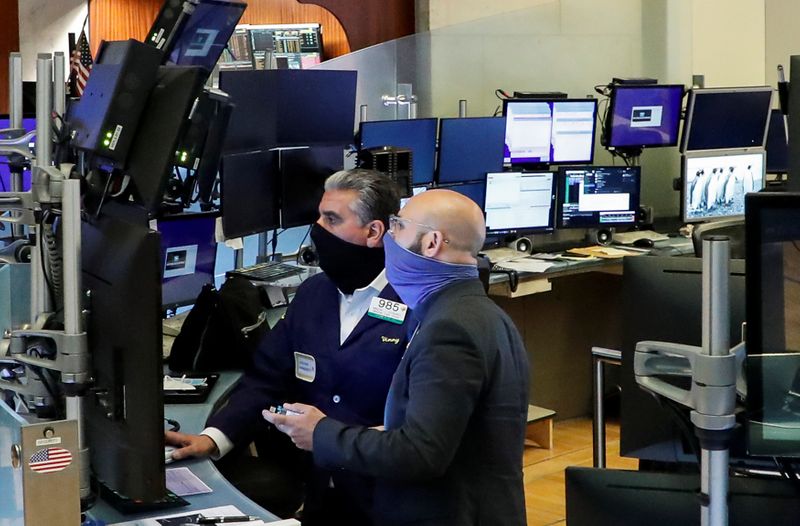NEW YORK (Reuters) – Wall Street retreated on Friday, heading into the weekend with a broad sell-off due to weak earnings, surging coronavirus cases and geopolitical uncertainties.
For the second day in a row, the tech sector weighed heaviest on all three major U.S. stock averages. Intel Corp <INTC.O> led the decline, its shares plunging 16.2% after the chipmaker reported a delay in production of a smaller, faster 7-nonometer chip.
“There’s a skittishness ahead of the weekend after yesterday’s tech and growth sell-off,” said Ryan Detrick, senior market strategist at LPL Financial in Charlotte, North Carolina.
“It’s been an unbelievable ride for the Nasdaq and tech over the last two moths,” Detrick added. “A well-deserved correction makes a lot of sense in our view.”
Each index posted a weekly loss, with the S&P 500 and the Dow snapping three-week winning streaks. Nasdaq had its weakest week of the last four.
The retreat followed a rally that brought the S&P 500 to nearly 5% below its record high reached in February. The bellwether index is now near break-even for the year, while the Nasdaq has gained more than 15% year-to-date.
“With the rally we’ve seen so far in July, it makes sense to see anxiety ahead of a huge earnings week, the Fed decision and what’s likely to be the worst GDP in our lifetimes,” Detrick added.
Momentum stocks Apple, Alphabet Inc <GOOGL.O> and Amazon.com <AMZN.O> are scheduled to post results on July 30, the day the U.S. Commerce Department is due to give its first take on second-quarter GDP. Analysts project that the economy dropped by a bruising 35% during the three-month period.
More than 1,000 Americans died from COVID-19 on Thursday, the third straight day for that grim milestone as total cases surged past 4 million.
Beijing fired back at Washington shuttering China’s Houston consulate by closing the U.S. consulate in the city of Chengdu.
The Dow Jones Industrial Average <.DJI> fell 182.44 points, or 0.68%, to 26,469.89, the S&P 500 <.SPX> lost 20.03 points, or 0.62%, to 3,215.63 and the Nasdaq Composite <.IXIC> dropped 98.24 points, or 0.94%, to 10,363.18.
Of the 11 major sectors in the S&P 500, all but consumer discretionary <.SPLRCD> closed in the red. Tech <.SPLRCT> was the biggest percentage loser.
Healthcare <.SPXHC> lost ground, dropping 1.1% ahead of executive orders by President Donald Trump aimed at lowering drug prices.
Second-quarter earnings season charges ahead, with 128 constituents of the S&P 500 having reported. Of those, 80.5% have cleared a very low bar of analyst expectations.
American Express Co <AXP.N> fell 1.4% after reporting an 85% slump in quarterly profit after setting aside nearly $628 million to cover potential defaults.
Verizon Communications Inc’s <VZ.N> beat analyst profit and revenue estimates as the telecom saw strong demand due to stay-at-home mandates, boosting its shares by 1.8%.
Honeywell International Inc’s <HON.N> cost-cutting efforts resulted in better-than-expected second-quarter profit, but cautioned of many unknowns going forward. Its shares dropped 2.8%.
Intel rival Advanced Micro Devices Inc <AMD.O> jumped 16.5%.
Tesla Inc <TSLA.O> extended Thursday’s losses, falling 6.3%.
Declining issues outnumbered advancing ones on the NYSE by a 1.92-to-1 ratio; on Nasdaq, a 2.77-to-1 ratio favored decliners.
The S&P 500 posted 8 new 52-week highs and no new lows; the Nasdaq Composite recorded 24 new highs and 24 new lows.
Volume on U.S. exchanges was 9.57 billion shares, compared with the 11.04 billion average over the last 20 trading days.
(Reporting by Stephen Culp; Editing by David Gregorio)

























